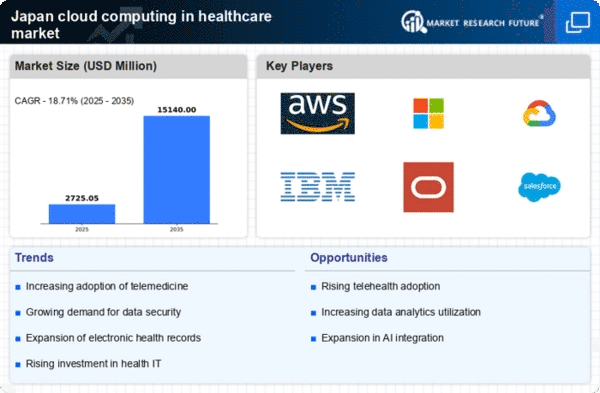Advancements in Cloud Technology
Technological advancements in cloud computing are significantly impacting the cloud computing-in-healthcare market in Japan. Innovations such as enhanced data storage solutions, improved security protocols, and the development of scalable cloud infrastructures are enabling healthcare organizations to adopt cloud technologies more readily. These advancements facilitate the seamless integration of various healthcare applications, improving operational efficiency and data management. Furthermore, the increasing availability of high-speed internet across Japan supports the deployment of cloud-based solutions, making them more accessible to healthcare providers. As these technologies continue to evolve, the cloud computing-in-healthcare market is expected to expand, offering new opportunities for healthcare delivery.
Growing Emphasis on Data Analytics
The cloud computing-in-healthcare market in Japan is increasingly influenced by the growing emphasis on data analytics. Healthcare organizations are recognizing the value of leveraging big data to enhance decision-making processes and improve patient care. Cloud-based analytics tools allow for the aggregation and analysis of vast amounts of health data, leading to insights that can drive clinical improvements and operational efficiencies. As the healthcare sector becomes more data-driven, the demand for cloud solutions that offer advanced analytics capabilities is likely to rise. This trend suggests a robust growth trajectory for the cloud computing-in-healthcare market, as organizations seek to harness the power of data to optimize healthcare delivery.
Increased Focus on Patient-Centric Care
The cloud computing-in-healthcare market is witnessing a shift towards patient-centric care models in Japan. Healthcare providers are increasingly recognizing the importance of tailoring services to meet individual patient needs. Cloud-based solutions enable the collection and analysis of patient data, allowing for personalized treatment plans and improved patient experiences. This trend is further supported by the growing demand for transparency and accessibility in healthcare services. As patients become more involved in their healthcare decisions, the cloud computing-in-healthcare market is likely to see a rise in applications that facilitate patient engagement and empowerment, ultimately leading to better health outcomes.
Rising Demand for Remote Patient Monitoring
The cloud computing-in-healthcare market in Japan is experiencing a notable surge in demand for remote patient monitoring solutions. This trend is driven by the increasing prevalence of chronic diseases and the need for continuous health management. According to recent data, approximately 30% of the Japanese population is living with chronic conditions, necessitating innovative healthcare solutions. Cloud-based platforms facilitate real-time data collection and analysis, enabling healthcare providers to monitor patients remotely. This not only enhances patient engagement but also reduces hospital readmission rates. As healthcare systems strive to improve efficiency and patient outcomes, the integration of remote monitoring technologies into the cloud computing-in-healthcare market is likely to expand significantly in the coming years.
Government Initiatives Supporting Digital Health
In Japan, government initiatives aimed at promoting digital health are playing a crucial role in the growth of the cloud computing-in-healthcare market. The Ministry of Health, Labour and Welfare has introduced various policies to encourage the adoption of digital technologies in healthcare. For instance, the 'Health and Medical Strategy' aims to enhance healthcare services through the use of IT solutions. This includes funding for cloud-based systems that improve data sharing and interoperability among healthcare providers. As a result, the market is projected to grow at a compound annual growth rate (CAGR) of around 15% over the next five years, driven by these supportive policies and investments in digital health infrastructure.
















